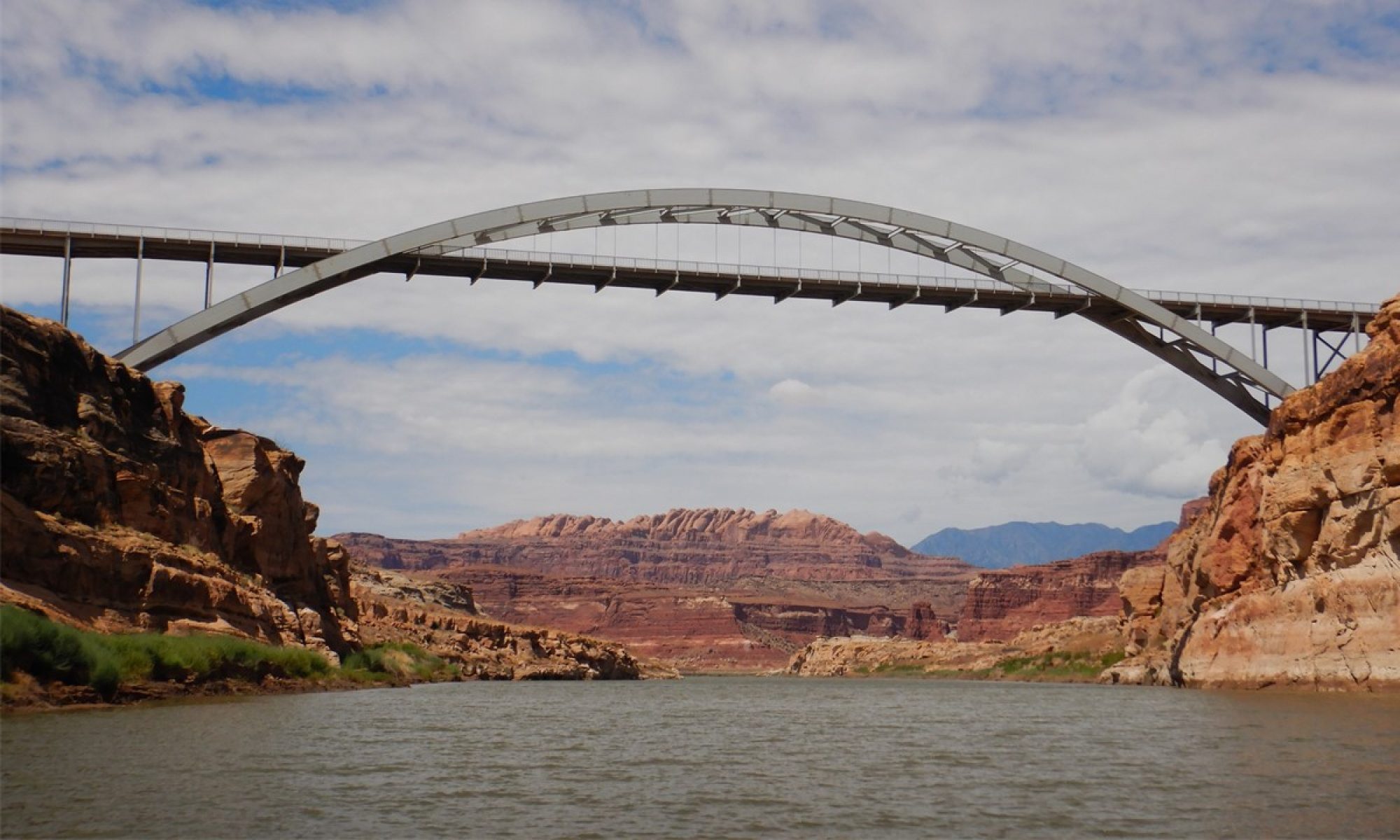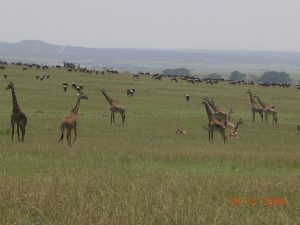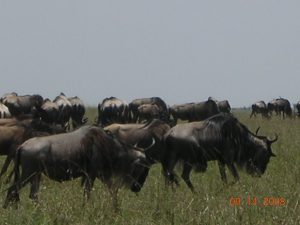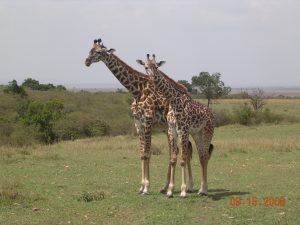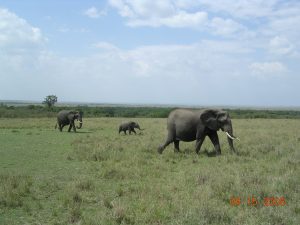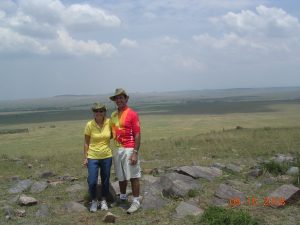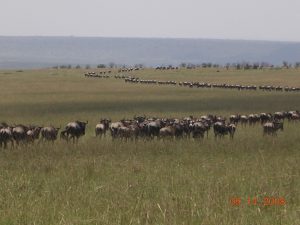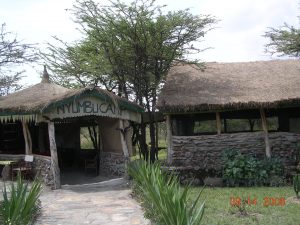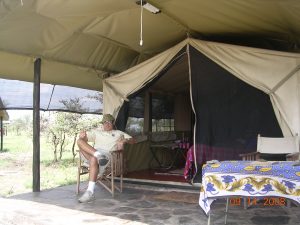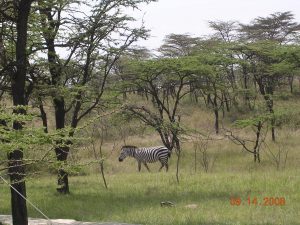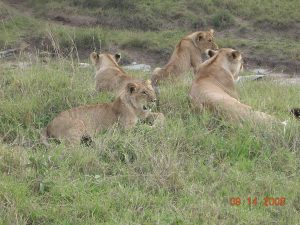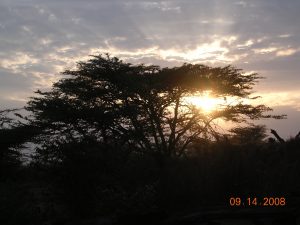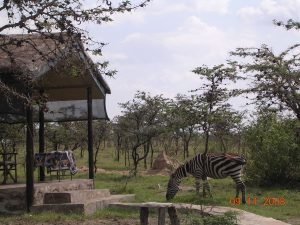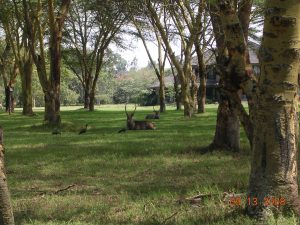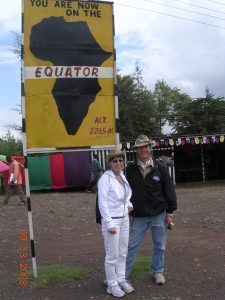We headed back to camp, sat on the porch and enjoyed a bottle of red wine together, and prepared for the coming rainstorm that was building in the distance.
The storm hit with strong winds and horizontal rain, forcing everyone in Nyumbu Camp to take temporary refuge in their tents. After an hour’s downpour, the rain turned to a sprinkle, and we ventured outside to find the nearly dry creek at the base of our camp turned into a 40-foot wide raging torrent. Zebra who find daily evening refuge in the security of the camp were caught looking forlorn on the other side stranded from their security. Phillip, the Camp’s Manager, assured us that the water would recede in a couple of hours, and so it would. At dusk, the camp directors moved the campfire into the headquarters tent, where our Maasai Guide and Assistant Manager, James, told us about growing up Maasai in Kenya. James is a college educated young man with a wife and 2 young children who was raised in the area. He dresses each day in native Maasai dress, but speaks perfect school English, and represents the blending of African tribal traditions with Western upward mobility. At 7:30pm we adjourned to dinner, and afterwards, we reassembled around the campfire for the anticipated stories. When eyelids grew heavy, we broke the camaraderie for bedtime, just in time to make our way to our tents amidst the roars and rumbles of lions on the plains on the other side of the river. Sleep came, though more nervously then normal, as the echos of preditor lions filled the small valley for the next 10-15 minutes. 
My eyes awoke with a start in the still blackness of night that surrounded us. I could tell by the luminescence of my watch’s dial that it was only a little after 2:00am, and the crunching and stomping outside of the tent is what woke me. Julie and I quietly rose and took a look out the screen into the moonlight, to see two Zebra almost within arm’s reach, feasting on the still wet grass around the tent. We took comfort in knowing that they thought it was safe here, as we crawled back under the covers to fall asleep.
We rose just before sunrise, again, and took a walk around the sleepy camp to survey the night’s handiwork. The river had receded to its normal trickle, and the sign of Zebra and Wildebeest around the camp was abundant. We wandered back to our social campfire patio to sit with morning coffee, and were lucky enough to see a family of three Velvet Monkeys 30 yards away playing hide-and-seek with the local tree trunks. 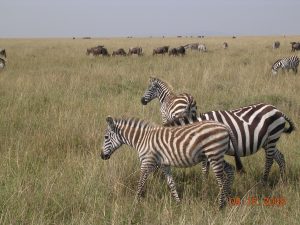
Sadly, we made our final check out after breakfast, and said our goodbyes to the other guests and staff. Phillip and James had made our short stay truly memorable, and we were sorry to have to leave. We used the few extra hours that we had in Kenya to re-enter the Maasai Mara Park, and take one last Game Drive through the Reserve. Given the rains of the night before, we stayed to the main roads, and took one last long look at the vistas of over 10,000 animals that filled our small horizon. In the distance were the ever present Elephants 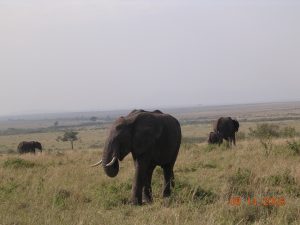 and Giraffes, and we came upon two new groups of Ostrich who were busy with their heads to the ground, eating – pausing only occasionally to look up and see what was going on around them.
and Giraffes, and we came upon two new groups of Ostrich who were busy with their heads to the ground, eating – pausing only occasionally to look up and see what was going on around them.
We started our trip to the park’s exit when our driver took a turn into a small quarry on the side of a hill where lay the park’s king, a male Lion, (Simba in Swahili), grooming himself without a care in the world. From only 20 feet away, one can finally appreciate just how big the animal is, with front paw pads measuring 10 inches across! We watched him for 15-20 minutes, until we decided that we needed to leave – a spectacular end to a wonderful visit. 
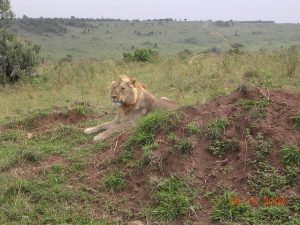 Within the Maasai Mara Park, we had seen at least 2 of every large, major animal, with the exception of the Rhinoceros. Only 20 years ago, there were hundreds of Rhinos here, but poachers looking to feed the black market for their horn almost wiped them out! Today, only 24 Rhinos are surviving in the Park, vigorously protected by the government and locals. The belief is that they are slowly making a comeback, but we are not destined to see one this time.
Within the Maasai Mara Park, we had seen at least 2 of every large, major animal, with the exception of the Rhinoceros. Only 20 years ago, there were hundreds of Rhinos here, but poachers looking to feed the black market for their horn almost wiped them out! Today, only 24 Rhinos are surviving in the Park, vigorously protected by the government and locals. The belief is that they are slowly making a comeback, but we are not destined to see one this time.
The drive back to Nairobi is long, bumpy and uneventful. We stop at a souvenir shop along the way to stretch our legs and take one last look at carvings and beadwork. After another hour’s journey, we reach Narok where we stop for lunch as Samuel seeks out his mother at a local market to stop and say “hi”. Narok is in the middle of the wheat farms. The farmers still dry the wheat by spreading it on huge sheets in the sun for 1-2 days. Full and tired, we resume our 5-hour journey to get back to Nairobi to catch our 7:00pm flight. At the airport, we warmly thank our Driver, Samuel, who is a fine a guide and driver as one could ever find. Sadly, we enter the airport and say goodbye to one of our memorable journey, ever.
